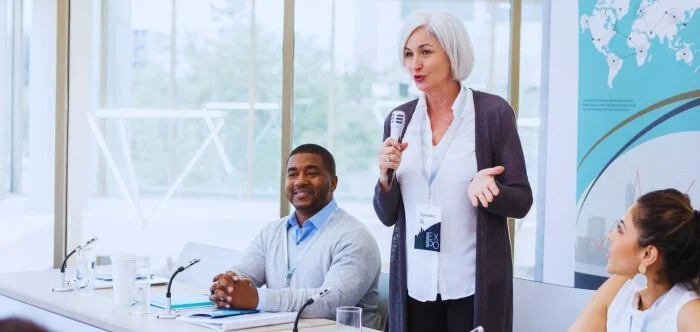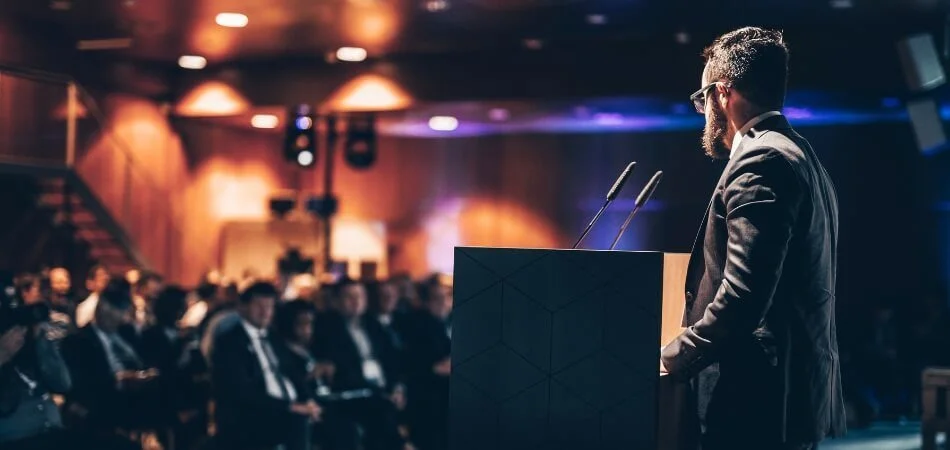A conference session moderator plays an important role in guiding discussions toward meaningful outcomes at professional events. This leads us to the crucial question: “How to moderate a conference session?”
To do it, one must combine thorough preparation, understanding the topic at hand, and getting acquainted with the speakers. The key lies in balancing time management, raising audience engagement, and ensuring a smooth flow of dialogue.
A moderator can transform a simple session into a hub of productive dialogue by encouraging questions, adeptly managing panelists, and maintaining a neutral and respectful atmosphere.
If you’re intrigued to learn more about this nuanced skill? Continue reading our article for a deeper dive into effective conference moderation techniques that promise to elevate your next session.
What Happens in a Conference Session?
A conference session is a fundamental component of academic, business, and professional gatherings, serving as a platform for presenting ideas, sharing expertise, and bringing up collaborative discussions. The exchange of knowledge and networking are integral components of attending a conference session from overseas.
In each session, speakers present their research or professional insights, often through a structured presentation. This is followed by a question-and-answer segment, allowing for deeper exploration and clarification. The audience engagement here is vital for a dynamic and interactive session.
The moderator plays a crucial role in guiding the session. They ensure time management, facilitate discussions, and maintain the session’s focus. Their skillful handling of the session contributes significantly to its success and productivity.
Types of Sessions a Conference Have
Conferences are dynamic events, offering various session types to cater to diverse interests and learning styles. Each session type presents unique opportunities for engagement, learning, and networking. Understanding these variations helps attendees find their way and benefit from the conference effectively.
Keynote Sessions
Keynote sessions are the highlight of many conferences, featuring distinguished speakers who are experts in their fields. These sessions often set the tone of the event and aim to inspire or provoke thought. Attendees can expect to gain valuable insights and perspectives on current trends and future directions. Well-structured keynote speeches are typically scheduled to attract maximum attendance and engagement.
Panel Discussions
Panel discussions bring together a group of experts to discuss a specific topic or issue. These sessions are interactive and provide diverse viewpoints, raising a deeper understanding of the subject. The moderator plays a vital role in guiding the conversation and ensuring active audience participation. Panel discussions encourage debate, question-and-answer sessions, and audience engagement.
Workshops
Workshops are hands-on sessions focused on skill development or practical application of concepts. Participants engage in activities, exercises, or group tasks, guided by facilitators. These sessions are ideal for learning new techniques, tools, or methodologies in an interactive environment. Workshops are often more intimate, allowing for personalized attention and in-depth exploration of topics.
Poster Sessions
Poster sessions are a visual and interactive method of presenting research or projects. Presenters display posters summarizing their work, allowing attendees to view and discuss content at their own pace. These sessions facilitate one-on-one interactions and in-depth conversations about the presented work. Poster sessions are common in academic and research-oriented conferences.
The variety of session types at conferences enriches the attendee experience, catering to different learning preferences and objectives. From inspiring keynotes to hands-on workshops, each session type plays a vital role in the overall success and impact of the conference.
Who Helps Organize the Conference Sessions?
Organizing conference sessions is a collaborative effort involving various roles, each contributing uniquely to the event’s success. From planning to execution, these individuals ensure that each session runs smoothly and effectively. Their coordinated efforts are crucial in creating an engaging and impactful conference experience.
Conference Organizers
Conference organizers are the architects of the event, overseeing the overall planning and coordination. They select themes, determine session formats, and manage logistics. Their vision shapes the conference’s structure and content, ensuring relevance and coherence. Organizers also liaise with other team members to bring the event to fruition.
Session Chairs
Session chairs are responsible for managing individual conference sessions. They introduce speakers, facilitate discussions, and ensure adherence to the schedule. Their role is pivotal in maintaining the session’s focus and flow, creating an environment conducive to learning and interaction. Chairs often are experts in the session’s subject matter.
Technical Staff
Technical staff provide essential support for the smooth operation of sessions. They handle audio-visual equipment, manage digital platforms, and troubleshoot technical issues. Their expertise is vital in today’s increasingly digital conference environments, ensuring uninterrupted delivery of content. They work behind the scenes but are integral to the session’s success.
Volunteers
Volunteers offer crucial on-the-ground support during the conference. They assist with registration, guide attendees, and provide general assistance. Their presence enhances the attendee experience by ensuring a welcoming and well-organized environment. Volunteers are often the unsung heroes of conference success.
The successful organization of conference sessions is a team effort, requiring the skills and dedication of various individuals. From the strategic planning of organizers to the on-site support of volunteers, each role is essential in creating a memorable and effective conference. Their collaboration ensures that the event achieves its objectives and leaves a lasting impact on its participants.
How to Moderate a Conference Session?
Moderating a conference session is both an art and a science, requiring a blend of preparation, communication, and leadership skills. A moderator’s role is critical in guiding the session to ensure it is informative, engaging, and runs smoothly. This step-by-step guide outlines the key tasks a moderator should undertake to effectively manage a conference session.
Step 1: Thorough Preparation
Before the session, familiarize yourself with the topic, speakers, and the audience’s background. Review the presentations and prepare relevant questions to stimulate discussion. This preparation is vital for a seamless transition between speakers and topics.
Step 2: Opening the Session
Start the session by introducing yourself, the topic, and the speakers. Set the tone for the session, outline its objectives, and briefly explain the format. An engaging opening is crucial for capturing the audience’s attention.
Step 3: Time Management
Keep a strict eye on the clock to ensure the session adheres to the scheduled time. Politely remind speakers of their time limits and manage the Q&A period effectively. Good time management prevents overrun and respects the attendees’ schedules.
Step 4: Facilitating Discussion
Encourage audience participation by inviting questions and comments. Facilitate the discussion to keep it on topic and ensure that it remains respectful and constructive. A lively yet controlled discussion enhances the session’s value.
Step 5: Closing the Session
Conclude the session by summarizing the key points discussed and thanking the speakers and audience. Offer a closing remark that ties the session back to the conference’s broader themes. A strong close leaves a lasting impression.
In summary, an effective conference moderator plays a pivotal role in the success of a conference session. From diligent preparation to the final closing, each step is crucial in creating a dynamic and impactful experience for speakers and attendees alike. Mastering these skills ensures that the session is not only educational but also engaging and memorable.
Considerations While Moderating a Conference
Moderating a conference session is a critical task that requires a thoughtful approach and careful consideration. A moderator’s ability to manage time, engage the audience, and facilitate discussions greatly impacts the session’s success. Here are some key considerations to keep in mind while moderating a conference session:
- Understanding the Audience: Know your audience’s background and interests to tailor the session accordingly. This ensures relevance and maximizes engagement throughout the session.
- Time Management: Strictly adhere to the allocated time for each speaker and segment. Effective time management is essential to cover all topics without rushing or overrunning.
- Encouraging Participation: Actively encourage questions and discussions from the audience. This creates a dynamic and interactive environment, enriching the session for all participants.
- Speaker Coordination: Maintain clear and proactive communication with speakers before and during the session. This ensures they are well-prepared and their presentations align with the session’s objectives.
- Handling Technicalities: Be prepared to handle any technical issues swiftly. A smooth technical operation is crucial for maintaining the flow and quality of the session.
- Neutral Facilitation: Remain neutral, especially during discussions and Q&A segments. A neutral stance helps in managing diverse opinions and maintaining a respectful atmosphere.
- Summarizing Key Points: At the end of the session, summarize the key takeaways. This reinforces the main messages and provides closure to the audience.
Moderating a conference requires a balance of preparation, adaptability, and effective communication. By considering these aspects, moderators can significantly enhance the quality and impact of the conference sessions, ensuring a rewarding experience for both speakers and attendees.
Common Mistakes to Avoid While Moderating a Conference Session
Moderating a conference session is a critical role that comes with its challenges. Even experienced moderators can fall into common pitfalls that can detract from the session’s effectiveness. Being aware of these mistakes is key to ensuring a smooth and successful conference experience. Here they’re:
- Neglecting Preparation: Failing to prepare adequately can lead to a disjointed session. Research speakers, topics, and the audience’s interests to ensure relevance and flow.
- Poor Time Management: Allowing speakers to exceed their allotted time disrupts the schedule. Keep a close watch on time to respect both speakers’ and attendees’ schedules.
- Dominating the Discussion: Over-participation by the moderator can stifle speaker and audience input. Facilitate rather than dominate to maintain a balanced and engaging discussion.
- Not Facilitating Q&A: Ignoring or poorly managing the Q&A session can lead to missed opportunities for engagement. Encourage and moderate audience questions to enrich the discussion.
- Lack of Neutrality: Displaying bias or favoritism disrupts the session’s objectivity. Remain neutral and respectful to all viewpoints for a fair and balanced session.
- Ignoring Technical Aspects: Overlooking technical requirements can cause disruptions. Check audio-visual and other technical setups beforehand to avoid glitches.
Avoiding these common mistakes is crucial for any moderator aiming to lead a successful conference session. By preparing thoroughly, managing time wisely, and facilitating discussions effectively, moderators can create a more productive and engaging experience for all participants. Remember, a moderator’s skill can significantly influence the session’s overall quality and outcome.
Closing Remarks
Based on the discussion so far on how to moderate a conference session, it is clear that the role of a moderator is multifaceted and requires meticulous preparation, adept time management, and the ability to facilitate engaging discussions.
Understanding the different session types, from keynote to poster sessions, and knowing the team’s roles in organizing these sessions, are foundational. Additionally, being aware of common pitfalls like poor time management or dominating the discussion is crucial for a moderator’s success.
The effectiveness of a conference session hinges on the moderator’s skills in steering the session towards productive outcomes, encouraging audience participation, and ensuring a seamless flow of dialogue. By mastering these aspects, moderators not only enhance the session’s value but also contribute significantly to the overall success of the conference.








